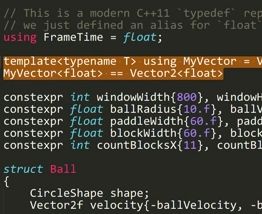
I've uploaded the second episode of "Dive into C++11" on my YouTube channel. You can find the first episode here.
You can find the complete playlist here.
In this episode we will learn more about two previously mentioned new awesome C++11 features: "constexpr" and "uniform initialization syntax".
Most importantly, we will also deal with a very big issue that every game developer must face: FPS/frametime, and how to avoid the game from behaving differently on slower/faster machines.
In addition, we'll also briefly learn about "const-correctness" and using the "noexcept" keyword.
We will analyze the "time-slice" method to allow the game to run smoothly and consistently on every machine.
In the last code segment, we will also "refactor" our code by creating a `Game` class, making our source much easier to read and maintain.
I greatly appreciate comments and criticism, and ideas for future videos/tutorials.
Feel free to fork the game's source code at: https://github.com/SuperV1234/Tutorials

Add a Comment
Comments are closed.